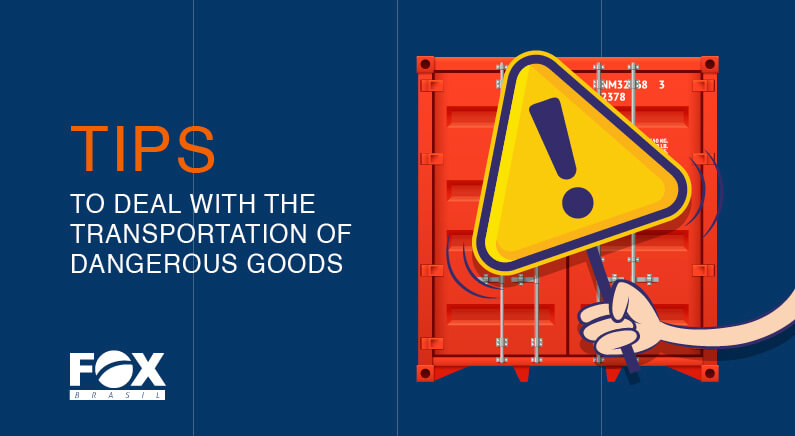5 tips to deal with the transportation of dangerous goods

Dicas da FOX Brasil para Agentes
One of the major challenges in the transportation of dangerous goods is ensuring that everything goes smoothly, safe and sound. After all, the success of logistics is not just about timely and cost-effective product deliveries. It is also necessary that the products arrive intact to their destination, without causing any kind of damage to the environment, merchandise, or the people involved in the operation.
For this reason, when it comes to handling and transporting hazardous products, the #1 role of the professionals in charge of the job is to take all the necessary safety measures appropriately. But how to ensure total safety for the operation? The answer is straightforward: it requires planning, organizational skills, and counting on the right equipment/staff.
In this post, we have listed 5 tips to help you ensure the safe transportation of dangerous goods such as explosives, flammable, toxic, corrosive or radioactive materials. Check it out!
Tips to ensure the safe transportation of dangerous goods
1- Conduct accurate planning and feasibility studies
The first tip to ensure the safe transportation of dangerous goods is having a good plan. Make sure to study the particularities of the material, understand what makes it a hazardous cargo and what kind of dangers you might be exposed to during its freight. From there, you can define the ideal way to handle it and avoid that any of these risks actually take place.
2- Hire appropriate staff
This kind of transportation is very delicate and requires specialized staff to take care of it, from planning to execution. In case of road transportation, for instance, your truck driver must instruct the workers about the right way to position the merchandise in the truck and be prepared to go through specific procedures to attest the safety of the freight in order to be released for the activity.
On top of that, all the staff should be properly trained to know exactly how to act in case of emergencies with the cargo.
3- Use the right modes of transportation/packaging
With proper planning, you will have collected all the information regarding the cargo and its particularities. This will enable you to develop the operation based on the ideal routes, modes of transportation and packaging to accommodate the dangerous cargo.
It is important to point out that legislation requires that vehicles carrying dangerous goods must have a set of emergency equipment according to the product transported. Furthermore, providing appropriate packaging to the cargo is also fundamental to guarantee its safety during transportation.
4- Obtain the necessary documentation
Each country has its own regulation and documentation requirements for the transportation of dangerous goods. In Brazil, for example, the National Land Transportation Agency (ANTT), does not require a specific license for this kind of freight, however, the truck driver must be enrolled in the RNTRC – National Registry of Freight Carriers.
Other required documents are the RADAR (a license issued by the Brazilian Federal Revenue that allows a company to import and export goods in Brazil), the Certificate of Inspection for Transportation of Dangerous Goods (CIPP) and the Vehicle Inspection Certificate (CIV) – both are provided by the Inmetro organization.
The invoice is also mandatory and must have product information, emergency information sheet, shipper’s declaration on the packaging and transportation envelope issued by the supplier.
5- Have a risk management strategy
Even though you have followed all the tips above, there is always the chance of an accident to which prevention is out of your reach, and all you can do is be prepared for it in case it happens. Therefore, our final tip is that you must know all the potential harms an operation developed by your company could cause if something went wrong. This knowledge will enable you to create strategies and action plans to effectively deal with each situation in a way that causes minimal damage to all the involved in the operation. Check out this post with how to improve your logistics risk management processes!
We hope this content was useful to you, and if you have any other tips or suggestions to deal with the transportation of dangerous goods, please let us know in the comments!
FOX Brasil – Expert in logistics and international transportation
We are a freight forwarder with years of experience in the development of integrated logistics solutions that link Brazil to the rest of the world. Our team is fully specialized to handle all kinds of cargo and operations. Do you wish to learn more information?
